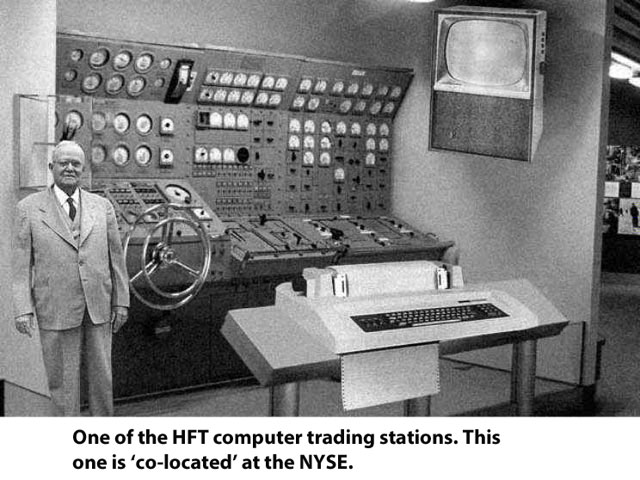
I’m amazed at what’s happened since the Mike Lewis/60 Minutes interview. It’s like the book has unearthed some heretofore unknown information. As a result of these ‘revelations’ the Press has gone mad (it’s a global story), and the FBI, SEC and DoJ have announced they are looking into the evils of HFT.
WTF? This is a very old story. Did the world forget about the Flash Crash? That was 4 years ago! Anyway, my hat is off to Lewis; he’s stirred this pot big time. So how might this turn out? My guesses, presented on the probability of the outcome.
#1 – Nothing happens at all. In a week or so the HFT headlines will die and people will quickly forget about something they have no clue what it is about. The SEC/FBI/DOJ inquires are just noise intended to calm public nerves because of the ‘news’ that the stock market is ‘rigged’. The D.C. response is at least four years late, and the stock market has always been rigged. Those investigations will go no where.
Note: The process of how Wall Street allocates the shares of hot IPOs (and secondary offerings) to friends (AKA “Big Customers”) is a much bigger deal for small investors than HFT. ‘Club Deals’ have been around for, well, forever.
#2 – Something Small from Washington. There could be steps taken to restrict some aspects of HFT. However, the rebates the exchanges currently pay are not going to end, so HFT will not only survive, it will get a blessing from the regulators.
#3 – Something Big from D.C. The SEC and FBI may scare the HFT crowd to death – but the DoJ could kill them. If the lawyers in blue suits find an avenue that concludes that HFT is in restraint of trade (or something of the same legal ilk) then it is cease-and-desist – ASAP.
#4 – Something from the HFT side. Consider the position these folks are in:
-They have the Feds up their asses! Every email/doc is coming out. Who really owns what, and what side deals exist will be disclosed. The investigations will make the player’s lives miserable.
-They have a terrible public image.
-Investors in these outfits (especially the big institutional players) must be getting cold feet.
-The legal bills for the Federal probes will be huge.
-They will get sued. It costs next to nothing to file a suit, it costs bundles to defend against them.
What might the owners of the computers do? They might offer some concessions (limits on certain types of activity, opening up some channels to level the playing field). – All bullshit steps, however, the bluff of cooperation might work.
On the other hand the HFT folks are potentially facing extinction. If they believed they were holding a bad hand, they might consider some desperate measures. They could gamble it all with a challenge to the market. A few of the players in this sandbox could ‘temporarily’ shut down their computers, and let the chips fall where they will. Given the well publicized attack on HFT by the D.C. polices forces, I think there is a case to be made for those in charge of the computers to limit the scope of their activities until the dust settles.
Me? I would love to see #4 (long shot). What might happen if the computers went into snail mode? I think it has the potential to blow up the markets. Volatility might spike as trading volume is cut in half. This kind of outcome would have the regulators (and the exchanges) crawling on their knees for the HFT crowd to get back to work. What a bizarre outcome that would be.
HFT is a bit like QE. It has been around for so long, and is now such a big part of the market structure that it’s not feasible to dial back the clock without consequences.
- Bulenox: Get 45% to 91% OFF ... Use Discount Code: UNO
- Risk Our Money Not Yours | Get 50% to 90% OFF ... Use Discount Code: MMBVBKSM
Disclaimer: This page contains affiliate links. If you choose to make a purchase after clicking a link, we may receive a commission at no additional cost to you. Thank you for your support!



Leave a Reply